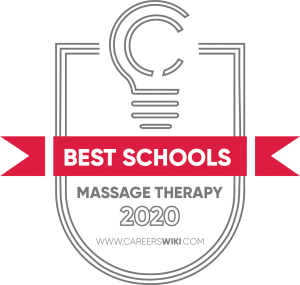…
There are eight massage therapy schools in Tennessee, including private institutes and public colleges. Some focus exclusively on MT, while others offer multiple educational programs.
Certificate and diploma programs take one year or less to complete. They are composed of classroom lectures, lab sessions, and clinical experience. Graduates are eligible to take an exam to qualify for state licensure.
Most massage therapists in the Volunteer State earn higher salaries or wages than the national average. The future is bright, with officials predicting 290 annual job openings during the decade ending in 2026.
Interested in viewing massage schools in other states?

The mission of this regulatory agency is “to safeguard the health, safety, and welfare of Tennesseans by requiring those who practice the profession of massage therapy be qualified.”
The board:
Massage therapy schools admit only applicants who have a high school degree or GED. Taking college-level science, health, and business classes may help in winning admission.
Schools that qualify for state approval are authorized by the Tennessee Higher Education Commission, the Tennessee Board of Regents, or a comparable agency in another state.
The board mandates that MT programs provide at least 500 clock hours of instruction. There must be 200 hours of science coursework, including anatomy, pathology, kinesiology, physiology (Eastern or Western), and hygiene/blood-borne pathogens.
The classes are to cover the benefits and contraindications of massage; basic massage techniques; manipulative techniques such as kneading, stretching, percussion, and joint movements; and draping, positioning, and personal body mechanics.
Ten hours need to be devoted to ethics, and five hours to Tennessee laws and rules. The state also calls for instruction in business practices, interpersonal communication, first aid, and the Americans with Disabilities Act.
The student-to-instructor ratio in the hands-on portion of a board-approved course may be no more than 14:1.
Programs vary in the types of massage and other therapies they teach. Most have courses in Western and Eastern modalities.
Students seeking to specialize in certain methods should examine the classes that schools offer.
To become a massage therapist in Tennessee, a graduate applies to the board for a license. This involves getting approval from the Federation of State Massage Therapy Boards to take the Massage and Bodywork Licensing Exam (MBLEx). The test is available regularly at Pearson VUE assessment centers in the state.
The board requires practitioners to renew their licenses, and obtain 24 hours of continuing education, every two years.
We selected the schools below based on the programs that they offer, accreditation, student population, graduation rate and reputation.
View our Ranking Methodology to learn more about how we rank schools.

NA
29
A private institution that became Tennessee’s first massage therapy school in 1987.
The 700-clock-hour curriculum here consists of 200 hours of anatomy, physiology, neurology, and pathology; 200 hours of massage theory and practice; 150 hours of allied modalities; and 50 hours of clinical work.
Classes covers Eastern, European, Western, and Ayurvedic massage methods. Students learn hydrotherapy, electro/heliotherapy, aromatherapy, electrotherapy, trigger points, reflexology, seated massage, and sports massage. Other classes teach techniques for specialized populations such as seniors, children, infants, pregnant women, the abused, and physically and psychologically challenged clients.
65%
34
This private school offers a 750-hour massage therapy certificate program on its campuses in McMinnville and Murfreesboro.
In addition to the state-required coursework, classes cover hydrotherapy, reflexology, aromatherapy, neuromuscular therapy, myofascial release, trigger point therapy, sports injury assessment, traditional Chinese medicine, and spa treatments. Students learn Swedish, deep tissue, medical, chair, prenatal, special populations, and Thai massage techniques.
The curriculum takes about a year of full-time study to complete. Day and evening class schedules are available. The school has a 100 percent acceptance rate, but class sizes are limited. Only about 10 students graduate from the MT program each year.
82%
48
Founded by massage therapists in Nashville, MBI is dedicated entirely to MT education. Its 700-hour certificate program takes nine months, Monday through Thursday, to finish. There are day and evening class options.
Along with the mandated courses, there are classes in Osteology and Myology, Advanced Anatomy & Physiology, Clinical Concepts, CPR, and Lymphatic Massage.
Program participants get practical experience at a student clinic, and spend 100 clock hours in clinical internships. The school provides job-placement services and continuing education courses. Classes begin in February, June, and September.
55%
102
This private technical school offers more than 30 career tracks on its campuses in Tennessee, Kentucky, and Ohio. Daymar began in 1963 as the Owensboro Business College in the Kentucky city of the same name.
The medical massage therapy certificate program involves 900 clock hours that take students 12 months to complete. No part-time option is available. The curriculum covers Swedish, therapeutic, sports, prenatal, and hot stone massage.
In addition to the state-required courses, there are classes in Hydrotherapy, Reflexology, and Orthopedic Massage Applications. Program participants give treatments to real clients at an on-campus clinic.
49%
238
This private vocational school operates campuses in Tennessee, Alabama, and Georgia. The site in Cookeville serves the Nashville-Chattanooga-Knoxville area. GCC awards certificates for massage therapists, medical assistants, estheticians, nail technicians, dental assistants, and cosmetologists.
Students in the MT certificate program, part of the college’s School of Beauty & Wellness, learn light and deep tissue massage, stone massage, pressure point therapy, prenatal massage, neuromuscular therapy, aromatherapy, and myofascial massage. Classes start every month.
The school touts its small class sizes, guest speakers, mock job interviews, licensing exam preparation, and local job-placement services.
59%
526
The student body here primarily represents East Ridge, Hixon, Signal Mountain, Jasper, and Cleveland. The school also offers massage therapy programs on five campuses in Georgia and the Carolinas.
The MT certificate curriculum focuses on “whole-body wellness.” It has a 900-clock-hour minimum, with as many as 1,350 hours available. Along with the standard courses Hydrotherapy & Aromatherapy, Somatic Psychology, Seated & Sports Massage, Energy Based Modalities, Spa Therapies, and Special Populations.
Students attend career workshops, as well as seminars in creating portfolios and building resumes. Graduates return for refresher courses and career assistance.
64%
1394
This private healthcare and dental school has 16 campuses in eight states. The East Memphis location is between Audubon Square and White Station.
CCC’s diploma program in massage therapy consists of 862 clock hours that take 44 weeks to complete. There are 507 hours of classroom theory, 255 hours of lab sessions, and 100 hours of clinical practice. Day and evening class schedules are available.
Students learn Swedish massage, acupressure, event sports massage, reflexology, and deep tissue massage. They administer full-body massages, for a fee, as well as free chair massages to members of the public at an on-campus clinic.
28%
5688
This public school offers a 720-clock-hour, 30-credit massage therapy certificate program that lasts 11 months. Students attend classes for three terms — in the fall, spring, and summer.
The program is based on Swedish massage and neuromuscular therapy, but also features an “overview of more than 100 approaches to therapeutic manipulation.” In addition to state-mandated courses, students take Massage for Special Populations and Somatic Therapy.
A competitive admissions process considers program applicants’ entrance exam scores, proficiency, and administrator interview performances. The school assists in resume writing, employment searches, and job placements. Job fairs give students opportunities to meet employers.
$21
$44,300
37%
In this state, $44,300 a year or $21.25 per hour is the average income—better than the national median of about $41,400 or $20.
Salaries and wages for the top-paid 10 percent in Tennessee are over $73,600 or nearly $35.50, less than the U.S. average of about $78,300 or $37.65. The state’s lowest-paid 10 percent make more than $17,800 or about $8.50, not as much as the nationwide median of over $21,300 or around $10.25.
Data from the federal Bureau of Labor Statistics indicates that Tennessee had 1,820 massage therapists in 2016. The BLS expects the figure to climb to 2,490 by 2016, a 37 percent gain. The projected national median for the 10-year period is 26 percent.
Sources: U.S. Bureau of Labor Statistics, CareerOneStop

LIMITED TIME DEAL